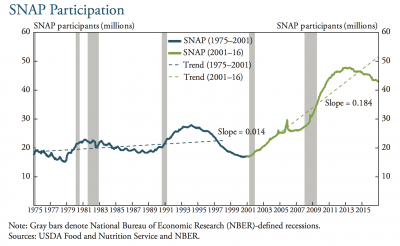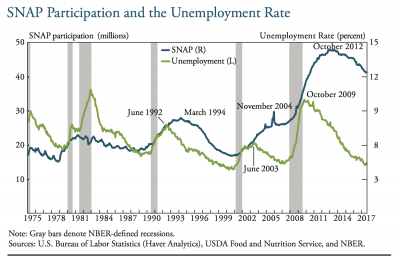Farm Progress' Joshua Baethge reported at the end of last week that "it’s hard to find anyone optimistic about passing a new farm bill this year. While the two political…
SNAP Provisions Central in House Farm Bill Draft- Markup Wednesday
On Thursday, the House Agriculture Committee released its draft of the Farm Bill. As expected, the nutrition title of the measure, which includes the SNAP program (food stamps) has garnered the most attention. For background, see FarmPolicyNews updates from March 15th, March 27th, March 29th, and April 10th.
Washington Post writer Caitlin Dewey reported late last week that, “House Republicans took their first step Thursday toward overhauling the federal safety net, pushing for new work requirements in the food-stamp program used by 42 million Americans.
“The plan, introduced as part of the 2018 Farm Bill over objections of Democrats, would dramatically expand mandatory state workfare programs in the Supplemental Nutrition Assistance Program, better known as food stamps.
Under the proposal, most adults between 18 and 59 will be required to work part-time or enroll in 20 hours a week of workforce training to receive assistance. The plan budgets $1 billion per year to fund the training program expansion.
Ms. Dewey explained, “The bill, slated for markup in the House Agriculture Committee on April 18, launches the first major skirmish in Republicans’ push to overhaul welfare and nudge recipients closer to self-sufficiency through work.
“House Speaker Paul D. Ryan (R-Wis.) and President Donald Trump have vowed to tighten work requirements in a range of welfare programs, with the president directing federal agencies on Tuesday to conduct a broad review of welfare work rules.
“The campaign has outraged Democrats who argue such changes hurt the poor. They also said the proposals in the Farm Bill lack the votes to advance to the Senate.”
The Post article added, “The Republicans’ proposed plan functions in two parts: First, it introduces a new, unified work requirement for all SNAP participants. Second, it mandates and massively expands the state training programs available to unemployed participants who cannot find jobs.”
Bloomberg writer Alan Bjerga reported on Thursday that, “The legislation, which would triple federal funds sent to states for employment and training programs while tightening eligibility rules for recipients of Supplemental Nutrition Assistance Program benefits, wouldn’t cut overall spending on the program. Overhauling welfare, a long-time GOP goal that’s on the wish list of retiring House Speaker Paul Ryan, has stalled in Congress this year, though efforts to increase work requirements in programs such as Medicaid continue.
“The measure would reauthorize all U.S. Department of Agriculture Programs, which are set to begin expiring on Sept. 30. Spending on farm subsidies and crop insurance, the two main farmer support programs, would be little changed, according to Republican House Agriculture Committee staff.”
.@ConawayTX11 on getting #SNAP policy right: It’s about helping every citizen realize the American dream by modernizing a program that helps lift folks out of poverty, rather than trapping them there. #HouseAg #farmbill pic.twitter.com/1tqofUSZ0P
— House Ag Committee (@HouseAgNews) April 11, 2018
Eleven GOP Members of the Ag Committee spoke in favor of the SNAP provisions on the House floor on Thursday afternoon (Congressional Record transcript here).
Committee Chairman Mike Conaway (R., Tex.) noted on the floor: “I believe that the good policies we put in place with the SNAP program that were released today, as people begin to understand what we are doing and begin to understand a bunch of the misinformation that has been in the public arena over the last several weeks about what we were trying to do, that that will dissipate and our colleagues across both sides of the aisle will see the wisdom of what we are going to do with respect to SNAP.”

Rep. Peterson stated,
These are a bunch of ideological zealots, is what they are, and I’ve had it. You know, there’s half of this SNAP stuff I actually supported, and could have supported, but they put this poison pill in there. They’re going to spend $13 billion on programs that are not going to work. It’s a complete waste of money. And this is the people that are supposedly against more government. And then they’re claiming that this how they’re, now they’re strengthening the program. I mean, give me a break. You might as well take that money and burn it.
Rep. Peterson also noted that he had not spoken with Chairman Conaway for four weeks.
He added, “Our members are unanimous in opposition to this because they have delved into it and they know that this is a joke, it’s a sham, and it doesn’t work. And they’re not going to vote for it.”

The editorial board at The Wall Street Journal indicated last week that, “Food stamps already has a de minimis work rule for some participants, but states have applied for waivers and exemptions that have diluted it. Yet the results of real welfare work requirements in states have been encouraging, including former Governor Sam Brownback’s reform in Kansas. A Foundation for Government Accountability paper last year noted that Kansas tracked 6,000 families who moved off welfare and went to work in 600 different industries. Incomes on average more than doubled over a year.”
The Journal added, “Democrats have attacked the plan with packaged lines that the GOP will kick millions off the rolls. The work rule doesn’t bounce a single person. One irony is that the left says work requirements are misguided because most recipients already work. Then why fight a requirement?”
.@HouseGOP's #FarmBill was written behind closed doors because Republicans don't want you to know it CUTS assistance for MILLIONS of Americans in #poverty who struggle with #hunger. America's farmers and families deserve so much better. My statement: https://t.co/zNQ7Rhok2e pic.twitter.com/SD9OW4Cmsl
— Jim McGovern (@RepMcGovern) April 12, 2018
A recent article at The Hill Online by Mike Lillis quoted the top Democrat on the Agriculture Committee’s nutrition subpanel, Rep. Jim McGovern (Mass.), from his interview Friday with C-Span’s ‘Newsmakers’ program: “From the very beginning I’ve said I will support a farm bill that doesn’t increase hunger in America. That was the bar I set, the line in the sand that I drew. Well, you know, this bill will increase hunger.”
Meanwhile, the Associated Press reported Friday, “The chairman of the House Agriculture Committee said Friday that he ‘generally opposes’ drug testing for food stamp recipients.
“The comments by Rep. Mike Conaway, R-Texas, came two days after The Associated Press reported that the White House was weighing a plan that could allow states to do just that.”





